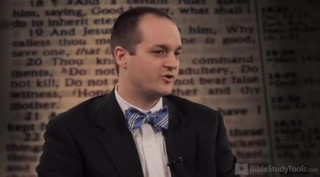
- Recent Translations
- All Translations
Jude 1:9
Share
Settings
Jude 1:9 Meaning and Commentary
Yet Michael the archangel
By whom is meant, not a created angel, but an eternal one, the Lord Jesus Christ; as appears from his name Michael, which signifies, "who is as God": and who is as God, or like unto him, but the Son of God, who is equal with God? and from his character as the archangel, or Prince of angels, for Christ is the head of all principality and power; and from what is elsewhere said of Michael, as that he is the great Prince, and on the side of the people of God, and to have angels under him, and at his command, ( Daniel 10:21 ) ( 12:1 ) ( Revelation 12:7 ) . So Philo the Jew F15 calls the most ancient Word, firstborn of God, the archangel; Uriel is called the archangel in this passage from the Apocrypha:
``And unto these things Uriel the archangel gave them answer, and said, Even when the number of seeds is filled in you: for he hath weighed the world in the balance.'' (2 Esdras 4:36)
when contending with the devil he disputed about the body of Moses;
which some understand literally of the fleshly and natural body of Moses, buried by the Lord himself, partly out of respect to him; and partly, as some think, lest the Israelites should be tempted to an idolatrous worship of him; but rather it was to show that the law of Moses was to be abolished and buried by Christ, never to rise more: and they think that this dispute was either about the burying of his body, or the taking of it up again; Satan on the one hand insisting upon the taking of it up, in order to induce the Israelites to worship him, and Michael, on the other hand, opposing it, to prevent this idolatry; but then the difficulty is, where Jude should have this account, since the Scriptures are silent about it. Some have thought that he took it out of an apocryphal book, called "the Ascension of Moses", as Origen F16, which is not likely; others, that he had it by tradition, by which means the Apostle Paul came by the names of the Egyptian magicians Jannes and Jambres; and some passages are referred to in some of their writings F17, as having some traces of this dispute; but in them the discourse is not concerning the body, but the soul of Moses; not concerning burying or taking up of his body, when buried, but concerning the taking away of his soul, when he was alive; which none of the angels caring to undertake, at length Samael, the chief of devils, did, but without success, wherefore God took it away with a kiss himself: besides, the apostle produces this history as a thing well known; nor is it reasonable to suppose that such an altercation should be between Michael, and the devil, on such an account; or that it was in order to draw Israel into idolatry on the one hand, and on the other hand to prevent it; since never was the custom of the Israelites to worship their progenitors or heroes; nor did they seem so well disposed to Moses in his lifetime; nor was there any necessity of taking up his body, were they inclined to give him honour and worship; yea, the sight of his dead body would rather have prevented than have encouraged it: but this is to be understood figuratively; and reference is had to the history in ( Zechariah 3:1 Zechariah 3:2 ) ; as appears from the latter part of this verse: some think the priesthood of Christ is intended, which was the end, the sum and substance, of the law of Moses; and seeing that Joshua, the high priest, was a type of Christ, and the angel of the Lord contended with Satan about him, he might be said to dispute with him about the body of Moses; but this sense makes a type of a type, and Christ to contend about himself; besides, this should rather be called the body of Christ than of Moses, others think that the temple of the Jews is meant about the rebuilding of which the contention is thought to be; and which may be called the body of Moses, as the church is called the body of Christ; though it should be observed, that the temple is never so called, and that not the place where the church meets, but the church itself, is called the body of Christ: but it is best of all to understand it of the law of Moses, which is sometimes called Moses himself, ( John 5:45 ) ( Acts 15:21 ) ( 21:21 ) ( 2 Corinthians 3:15 ) ; and so the body of Moses, or the body of his laws, the system of them; just as we call a system of laws, and of divinity, such an one's body of laws, and such an one's body of divinity: and this agrees with the language of the Jews, who say F18, of statutes, service, purification that they are (hrwth ypwg) , "the bodies of the law"; and so of Misnic treatises, as those which concern the offerings of turtle doves, and the purification of menstruous women, that they are (ypwg) , "the bodies" of the traditions F19, that is, the sum and substance of them: so the decalogue is said F20 to be "the body of the Shema", or "Hear, O Israel", ( Deuteronomy 6:4 ) , so Clemens of Alexandria F21 says, that there are some who consider the body of the Scriptures, the words and names, as if they were, (to swma tou mwsewv) , "the body of Moses" F23. Now the law of Moses was restored in the time of Joshua the high priest, by Ezra and Nehemiah. Joshua breaks some of these laws, and is charged by Satan as guilty, who contended and insisted upon it that he should suffer for it; so that this dispute or contention might be said to be about the body of Moses, that is, the body of Moses's law, which Joshua had broken; in which dispute Michael, or the angel of the Lord, even the Lord Jesus Christ himself,
durst not bring against him a railing accusation;
that is, not that he was afraid of the devil, but though he could have given harder words, or severer language, and which the other deserved, yet he chose not to do it, he would not do it; in which sense the word "durst", or "dare", is used in ( Romans 5:7 ) ;
but said, the Lord rebuke thee;
for thy malice and insolence; see ( Zechariah 3:2 ) ; and this mild and gentle way of using even the devil himself agrees with Christ's conduct towards him, when tempted by him in the wilderness, and when in his agony with him in the garden, and amidst all his reproaches and sufferings on the cross. And now the argument is from the greater to the lesser, that if Christ, the Prince of angels, did not choose to give a railing word to the devil, who is so much inferior to him, and when there was so much reason and occasion for it; then how great is the insolence of these men, that speak evil of civil and ecclesiastical rulers, without any just cause at all?
F15 De Confus. Ling. p. 341. & quis. rer. divin. Haeres. p. 509.
F16 (peri arcwn) , l. 3. c. 2.
F17 Debarim Rabba, fol. 245. 3, 4. Abot R. Nathan, c. 12. fol. 4. 2, 3. Petirath Mosis, fol. 57. 1. &. c.
F18 Misn. Chagiga, c. 1. sect. 8.
F19 Pirke Abot, c. 3. sect. 18.
F20 T. Hieros. Beracot, fol. 6. 2.
F21 Stromat, l. 6. p. 680.
F23 Vid. Chion. Disput. Theolog. par. 1. & 2. De Corpore Mosis, sub Praesidio Trigland. Lugd. Batav. 1697.

